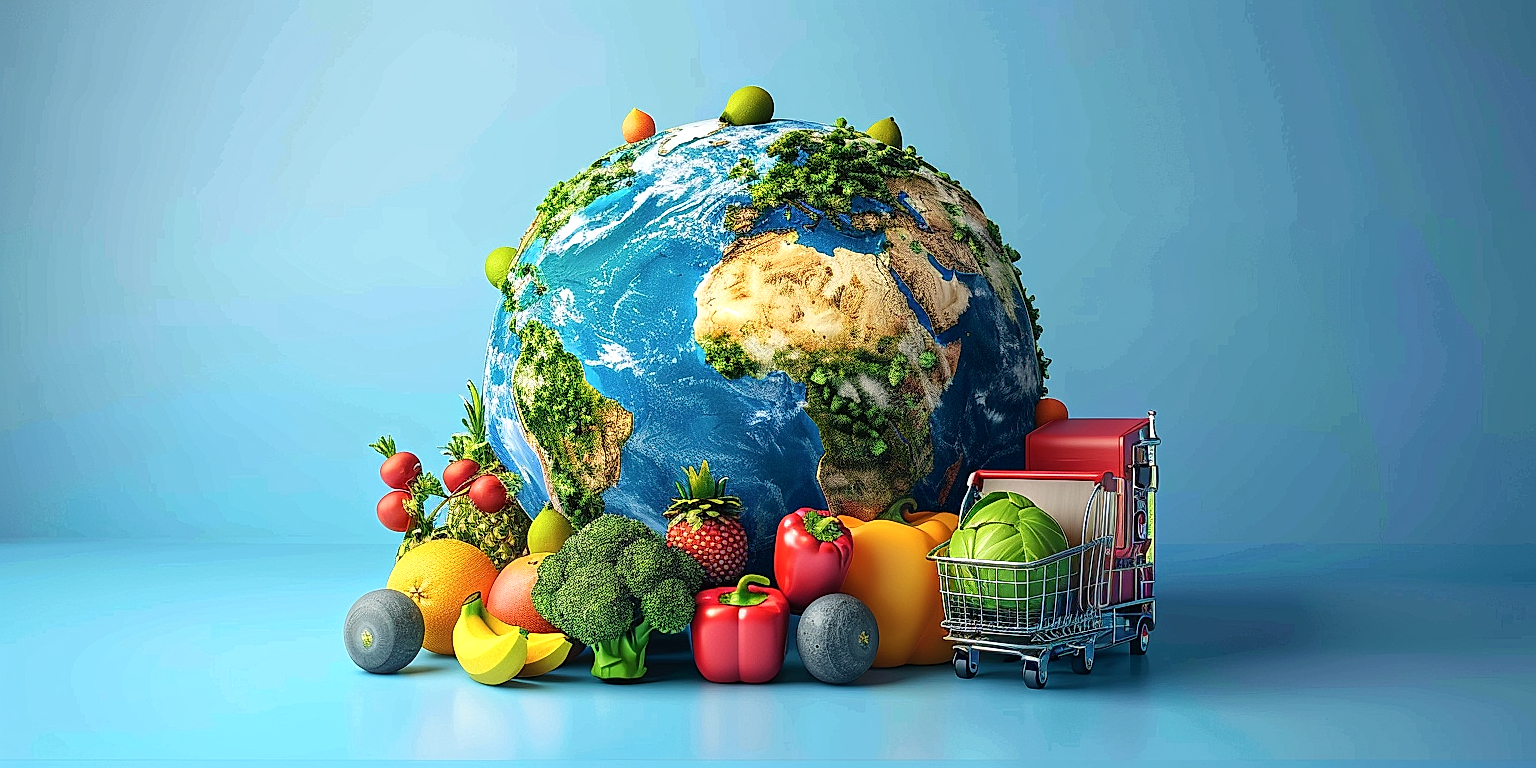As the global economy continues to shift and evolve, the spotlight is increasingly shining on emerging markets.
These under-explored territories hold significant potential for profit and expansion, especially for produce shippers.
But along with the promise of lucrative rewards, they present unique sets of challenges.
Understanding these markets is key to navigating them successfully.
This requires thorough research, careful planning, and strategic decision-making.
Today, we explore the opportunities these markets present and share insights on how to leverage them effectively.
Contents
- Opportunities In Emerging Markets For Produce Shippers
- 1. Increased demand for exotic fruits and vegetables
- 2. Growing Middle Class with Higher Disposable Incomes
- 3. Increased health awareness promoting fruit consumption
- 4. Growing Retail and E-commerce Food Sectors
- 5. Exploring untapped markets in African countries
- 6. Potential for Organic Produce in Asian Markets
- 7. Rising trends in convenient, ready-to-eat produce.
- The Bottom Line
Opportunities In Emerging Markets For Produce Shippers
1. Increased demand for exotic fruits and vegetables
The global food market is presently witnessing an increased demand for exotic fruits and vegetables, creating new growth opportunities for produce shippers.
This surge in demand can primarily be attributed to an emerging demographic of consumers who are open to trying new varieties of fruits and vegetables that are not typically grown in their respective regions.
With the rise in economic prosperity and enhanced logistics, consumers across the globe now have access to a wide array of exotic produce from around the world.
Farmer’s markets, premium grocery stores, and even online food retailers are now offering a wide variety of exotic fruits and vegetables, bridging the gap between growers from far-flung areas and consumers in urban locales.
Naturally, this trend has opened up new avenues for shippers specializing in the transport and distribution of exotic produce.
From berries and jackfruits to organic tomatoes and avocados, the demand for unique produce has created a expanding market for shippers.
Accurate shipping methods ensure that the exotic produce retain their freshness and nutritive value during the long journey from the farm to a customer’s table.
This calls for the utilization of modern technology in refrigeration and preservation techniques.
One such method is modified atmospheric packaging (MAP), which helps to prolong the freshness of these fruits and vegetables.
The innovation in packaging is just one of the several benefits that have come with the increased demand for exotic fruits and vegetables.
At the same time, this trend has given growth to a niche market, that of organic and ethically sourced exotic produce, presenting shippers with yet another avenue of opportunity in the burgeoning market.
For suppliers dealing with such premium produce, establishing effective distribution channels and a sound logistics framework is crucial in order to capture this growing market.
The key to success lies not only in ensuring the quality of the exotic goods being shipped but also in making these products accessible to discerning consumers in different parts of the world.
Produce shippers need to keep abreast of the latest transportation technologies, regulations relating to import-export of agricultural produce, and market trends to optimize their operations and maximize profitability.
Given that the demand for exotic produce is showing no signs of slowing down, it should serve as a clear sign for produce shippers that investment in strategic planning and logistical capabilities will result in strong growth prospects.
In this era of global food trends, riding the wave of exotic fruits and vegetables commerce could potentially offer lucrative returns for produce shippers.
2. Growing Middle Class with Higher Disposable Incomes
The emergence of a growing middle class in various developing nations presents bountiful opportunities for produce shippers.
These growing populations are finding themselves with higher disposable incomes, meaning they are able to afford a wider variety of food products.
The middle class’s increased purchase power can ultimately boost the demand for imported fruits and vegetables.
Produce shippers who can successfully tap into these markets could see substantial growth in their business.
It’s noteworthy to mention that the middle class’s growth has been a focal point of economic development in several emerging markets.
This emergent demographic is likely to be a key driver for consumption of a wider variety of fresh produce, presenting lucrative opportunities for businesses involved in produce shipping.
With more money to spend, these households often seek out new and exotic fruits and vegetables, resulting in a broader demand for imported goods.
Furthermore, they are more likely to pay for convenience, positively impacting the packaged, ready-to-eat produce product sectors.
Therefore, the emerging middle class populations with increasing purchasing power and willingness to spend on diverse and quality food products can immensely boost the profits of produce shippers who successfully cater this market.
Moreover, studies suggest that the global middle-class spends nearly two-thirds of its budgets on groceries, especially fresh and quality produce.
Notably, most of these fresh produce are often not locally available or are out-of-season, thus ushering in the need for imported produce which produce shippers can amply provide.
The ability of the middle class to spend more on necessities, let alone luxuries, is a significant swing in economic empowerment that impacts the food market directly.
In essence, the rise of a wealthier middle-class segment opens new doors for a variety of food products that can be transported by produce shippers, touching numerous points of the supply chain.
To fully tap into these opportunities, produce shippers should lean into identifying or predicting the fresh produce preferences of this emerging affluent demographic as part of their market strategy.
In conclusion, the growing middle-class with higher disposable incomes in emerging markets is a driving force in the consumption of exotic and organic fruits and vegetables, making it a prime opportunity for produce shippers to increase their market share and profits.
3. Increased health awareness promoting fruit consumption
One of the significant trends influencing the global market for fruits and vegetables is increased health awareness.
Across the globe, consumers are becoming more and more conscious about their diets and lifestyles.
A key driving force behind this shift is the awareness of the health benefits associated with consuming a wide variety of fruits.
With this increased health awareness, there is a growing demand for fresh, nutritious, and exotic fruits in both developed and emerging markets.
This demand is primed to provide lucrative opportunities for produce shippers.
The shift towards healthier lifestyles has not only increased the consumption of traditional fruits but also that of exotic fruits that promise unique health benefits.
Fruits like dragon fruit, durian, and guava are becoming popular in markets where they were previously unheard of due to the perceived health benefits they offer.
Produce shippers that deal with such fruits have an excellent opportunity to expand their business and gain a competitive edge.
In emerging markets, this trend is even more pronounced with fruits seen as a major component in the quest to lead a balanced and healthy lifestyle.
Public health campaigns in these markets are placing a heavy emphasis on the consumption of fruits and vegetables.
Produce shippers can capitalize on this trend by not only supplying these markets with the requisite fruits but also educating consumers about the health benefits of these fruits.
Moreover, with an increase in the consumption of organic fruits driven by the perceived absence of harmful chemicals used in cultivation, produce shippers dealing in organic fruits have an enormous potential for growth.
Emerging markets, with their growing middle class, present the perfect opportunity for these shippers to expand their operations and cater to the growing demand.
This increased health awareness and resultant consumption of fruits is an encouraging sign for produce shippers.
It presents opportunities for growth and expansion into new, potentially profitable markets.
To maximize the potential of this opportunity, shippers need to understand the specific demands and trends in each market and tailor their offerings accordingly.
4. Growing Retail and E-commerce Food Sectors
The emergence of retail and e-commerce in the food sector presents unprecedented opportunities for produce shippers in emerging markets.
The ease and convenience provided by these platforms have led to a surge in online grocery shopping which can be capitalized on.
Research shows that this rise in e-commerce is expected to continue, particularly in urban areas of developing nations.
Online marketplaces offer a direct channel for produce shippers to reach end consumers.
As a result, shippers can bypass traditional supply chains, thereby reducing costs and increasing their profit margins.
An increase in e-commerce translates to produce shippers seizing the opportunity to directly reach consumers, sidestepping traditional supply chains and their corresponding costs.
It is important for produce shippers to embrace innovative technologies that support e-commerce, involving everything from inventory management to delivery logistics.
Furthermore, the growing acceptance of digital payments in emerging markets presents an additional opportunity for e-commerce growth.
Retail and e-commerce channels also provide an excellent opportunity for branding and promotion.
These platforms allow producers to tell their story and differentiate their products from others in the market.
Direct feedback from the consumer base can also be gathered through these channels, providing valuable insights that can be used to improve product offerings and services.
Change in consumer behavior is evident with people now preferring to shop for groceries online, giving greater market access to produce shippers.
While e-commerce platforms provide the convenience of shopping from home, retail outlets serve the consumers’ need for physical interaction with the product before making a purchase.
Hence, a combination of both retail and e-commerce strategies can help maximize market reach and sales.
However, it’s crucial to continuously invest in and update these platforms based on customer feedback and technological advancements.
The rise of the retail and e-commerce sectors showcases a global shift in food shopping and opens up new avenues for produce shippers to tap into emerging markets.
5. Exploring untapped markets in African countries
The African continent presents numerous opportunities for produce shippers in the fruit and vegetable sector.
These opportunities emanate from the continent’s enormous agricultural potential coupled with rising urbanization and the growth of the middle-class.
With over 60% of the world’s uncultivated arable land, Africa presents enormous potential for agricultural expansion.
Additionally, the lack of adequate infrastructure in many parts of the continent has led to limited access to fresh fruits and vegetables, creating a demand-supply gap that presents lucrative opportunities for produce shippers.
Furthermore, Africa’s urban population growth is expected to surpass Asia’s by 2030, which will lead to increased demand for varied food products, including exotic fruits and vegetables.
The rising middle-class in many African countries is increasingly adopting healthier diets, which further boosts the demand for fresh fruits and vegetables.
Given these factors, the opportunities in African markets are vast and largely untapped by produce shippers.
Many African countries have also begun undertaking agricultural reforms to attract investments, making it easier for produce shippers to set up operations and expand their reach.
At the same time, the African Continental Free Trade Area (AfCFTA), set to become operational in 2021, will facilitate intra-African trade and provide produce shippers with access to a unified market.
However, venturing into African markets is not without its challenges.
These include infrastructure inadequacy, unreliable electricity, bureaucratic hurdles, and sociopolitical instability in some regions.
Yet, despite these challenges, the potential rewards for produce shippers who are willing to navigate this landscape can be substantial.
Therefore, strategic partnerships with local companies and a deep understanding of the local market dynamics are essential for success in these markets.
In summary, while the African continent presents unique challenges to produce shippers, the potential rewards in this untapped market are significant.
With the right approach and strategies, produce shippers can tap into these markets and establish a strong presence, thereby expanding their global footprint in the fruit and vegetable sector.
Ultimately, the continent offers a compelling case for produce shippers looking to expand their operations and capitalize on the opportunities available in emerging markets.
6. Potential for Organic Produce in Asian Markets
Emerging markets, especially in Asia, show a growing potential for organic produce.
Among the various factors driving this trend is an increasing health consciousness among the Asian population.
Being privy to the benefits of organic foods, they are steadily showing a preference for organic fruits and vegetables over conventionally grown produce.
There is an observed change in consumer behaviour rushing towards leading a healthier lifestyle.
In countries like India, China, Japan, and South Korea, organic food markets are expanding at an unprecedented pace.
This expansion is paving the way for international organic produce shippers to step in and cater to this burgeoning demand.
Moreover, governments in these countries are encouraging organic farming practices by providing incentives and subsidies to farmers.
This governmental support is poised to further boost the growth of the organic produce market.
Furthermore, there is a surge in e-commerce platforms that cater to organic grocery shopping, enabling easier access for consumers.
These digital podiums extend the reach of organic produce shippers and allow them to enter the Asian markets efficiently.
Produce shippers should consider participating in industry fairs and exhibitions to draw attention to their organic produce in these markets.
Besides, they should collaborate with local partners to get a better understanding of the market and target audience.
Understanding the local palate and preference can also help in tweaking the products to make them more appealing to the Asian customers.
With proper market research and strategy, companies can tap into this emerging opportunity and expand their global footprint in the organic produce market.
The potential for organic produce in Asian markets is vast and goes beyond just the demand for organic fruits and vegetables. It provides an avenue for the growth of value-added organic products too.,
7. Rising trends in convenient, ready-to-eat produce.
As new markets emerge, one consistent demand in the global produce industry is the rise of convenient, ready-to-eat produce.
These convenient food options, often neatly packaged and ready for immediate consumption, are incredibly appealing to increasingly busy populations in emerging economies.
Among the numerous opportunities in emerging markets for produce shippers, the surge in popularity of these ready-to-eat options stands out dramatically.
With the ongoing transformation of lifestyle habits and dietary preferences, consumers across the globe are seeking quicker, healthier meal choices which ready-to-eat fruits and vegetables can provide.
As such, there is a significant opportunity for produce shippers to tap into these markets by offering a variety of pre-cut, pre-washed, and ready-to-consume fresh produce.
From pre-cut mangoes in India to pre-packed salads in Kenya, the face of the produce industry is changing rapidly.
This trend is not limited to developed markets, as consumers in developing countries are also embracing ready-to-eat produce due to increasing urbanization and busy lifestyles.
Furthermore, as health consciousness increases, consumers are becoming more aware of the benefits of consuming these foods.
The rise in disposable income among the middle class in these emerging markets further boasts the demand for ready-to-eat produce.
Produce shippers can also leverage e-commerce platforms to deliver these products directly to the consumer, further enhancing convenience and promoting a healthy lifestyle.
One of the key advantages for produce shippers targeting this market segment is the higher value addition and profit margins that ready-to-eat produce can offer compared to traditional produce.
However, reliable supply chains, quality assurance, and attractive packaging are critical factors for success in this rapidly growing segment of the food industry.
Given the diverse consumer preferences across different countries and cultures, produce shippers also need to innovate constantly and tailor their offerings to local tastes and dietary preferences.
For instance, in some Asian markets, consumers may prefer ready-to-eat tropical fruits, while in African countries, a range of indigenous vegetables may be more appealing.
In conclusion, the rising trend of convenient, ready-to-eat produce poses an exciting opportunity for produce shippers in emerging markets, offering potential for increased profit margins and a wealth of untapped consumer demand.
The Bottom Line
Overall, the global demand for exotic fruits and vegetables is on the rise primarily due to an increasing middle class with ample disposable income, and heightened health awareness which is now steering people towards healthier dietary options.
The growth trajectory is being accelerated by the expanding retail and e-commerce sectors in food.
Moreover, untapped markets such as those in African countries offer exciting growth opportunities for this industry.
Organic produce is also beginning to show great potential, especially within Asian markets.
Finally, consumer preference for convenient, ready-to-eat products is shaping the future of the produce industry, making it clear that this trend towards better health and convenience is set to continue.




